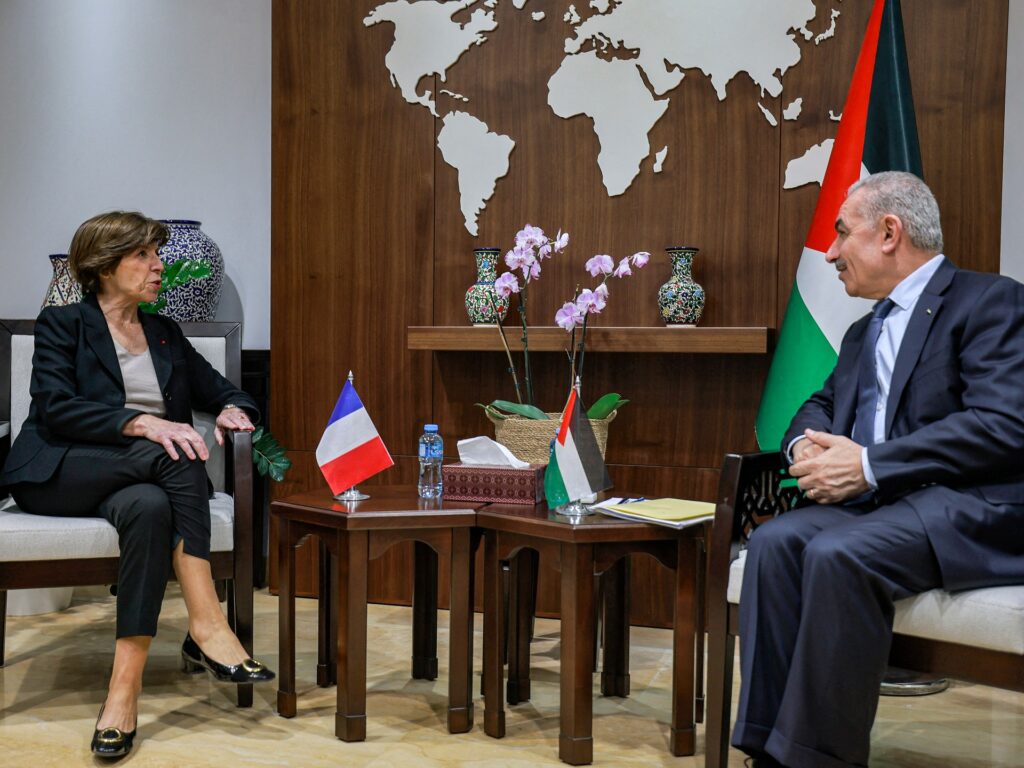During her visit on Sunday to a village near Ramallah, French Foreign Minister Catherine Colonna denounced the violence committed by Israeli settlers in the occupied West Bank, which “undermines the prospects of reaching a political solution.”
Colonna said, “These are dangerous actions that undermine the prospects for reaching a political solution, weaken the Palestinian Authority, and could push toward new developments and destabilize the West Bank,” noting that this matter is not in Israel’s interest.
Colonna arrived in Israel on Sunday, where she met her counterpart Eli Cohen, then moved to the occupied West Bank and met with Palestinian officials, including Prime Minister Muhammad Shtayyeh. Tomorrow, Monday, the French Minister will visit Beirut.
Colonna called for an “immediate and sustainable” truce in the Gaza Strip and a reduction in escalation with Lebanon in light of the mutual bombing with Hezbollah.
Recently, Israel has faced increasing calls for a new truce in the Gaza Strip in light of the sharp rise in the number of civilian deaths in its war on Gaza, which led to the death of at least 18,800 people, the majority of whom were women and children.
During a joint press conference with Cohen in Tel Aviv, Colonna expressed her country’s “deep” concern about the situation in the Gaza Strip, calling for an “immediate and sustainable new truce” in the war.
Israel’s northern border with Lebanon witnesses an exchange of bombing on a daily basis between the Israeli army and Lebanese Hezbollah.
The party confirms that it targeted Israeli border military sites and points, and the Hebrew state responded with air and artillery bombardment targeting military and civilian targets in southern Lebanon.
Diplomacy or force
The party stresses that its operations come within the framework of “supporting” the Palestinian people and the “resistance” in Gaza.
The border tension between Lebanon and Israel was the focus of discussion in Colonna’s visit, which called on all parties to “reduce the escalation” in this region.
She said during her visit to a military base near Tel Aviv, “The risk of escalation remains, and if things get out of control, I think that would not be in anyone’s interest, and I say that to Israel as well.”
She added, “This call for caution and de-escalation applies to everyone.”
Cohen believed that “France can play a positive and important role in preventing a war in Lebanon.”
Cohen stressed that “Israel has no intention of opening another front on our northern border, but we will do whatever is necessary to protect our citizens,” noting that more than 50,000 Israelis have been displaced from the border areas in northern Israel.
He added, “We must ensure their security so that they can return to their homes,” and “the only way to do this is to force Hezbollah to withdraw north of the Litani River.”
“There are two ways to do this: either through diplomacy or through force,” Cohen explained.
A Western diplomatic source in Beirut reported that “Israel wants Hezbollah to retreat 40 kilometers from the border,” and that the Israelis in particular want the party to withdraw the fighters of its elite unit, the “Radwan Force,” and heavy weapons from the areas south of the Litani River. In southern Lebanon.
While the party responds that it has no visible public presence in the border region, Naim Qassem, its Deputy Secretary-General, confirmed earlier this week his refusal to discuss “any situation in southern Lebanon with anyone as the aggression against Gaza continues.”
Reply in the Red Sea
The war in Gaza raises fears that the scope of the conflict will expand to other fronts in the region. Recently, the Houthis intensified their attacks in the Red Sea region, targeting commercial cargo ships heading to Israel.
This prompted major transport companies to suspend the transit of their ships in this vital sea lane for global trade, which links the Bab al-Mandab Strait and the Suez Canal.
Colonna warned that these attacks “cannot remain unanswered,” stressing that “we are examining several options with our partners,” including a “defensive role to prevent this from happening again.”
The French Ministry of the Armed Forces announced on Tuesday that a French ship that was patrolling in the Red Sea shot down on Monday a drone that was threatening a tanker flying the Norwegian flag that was attacked by the Houthis.

